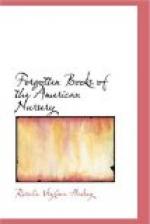The Puritan conception of life, as an error to be rectified by suffering rather than as a joy to be accepted with thanksgiving, made the preparation for death and the dreadful Day of Judgment the chief end of existence. The catechism, therefore, with its fear-inspiring description of Hell and the consequences of sin, became inevitably the chief means of instructing children in the knowledge of their sinful inheritance. In order to insure a supply of catechisms, it was voted by the members of the company in sixteen hundred and twenty-nine, when preparing to emigrate, to expend “3 shillings for 2 dussen and ten catechismes."[6-A] A contract was also made in the same year with “sundry intended ministers for catechising, as also in teaching, or causing to be taught the Companyes servants & their children, as also the salvages and their children."[6-B] Parents, especially the mothers, were continually exhorted in sermons preached for a century after the founding of the colony, to catechize the children every day, “that,” said Cotton Mather, “you may be continually dropping something of the Catechism upon them: Some Honey out of the Rock”! Indeed, the learned divine seems to have regarded it as a soothing and toothsome morsel, for he even imagined that the children cried for it continuously, saying: "O our dear Parents, Acquaint us with the Great God.... Let us not go from your Tender Knees, down to the Place of Dragons. Oh! not Parents, but Ostriches: Not Parents, but Prodigies."[6-C]
Much dissension soon arose among the ministers of the settlements as to which catechism should be taught. As the result of the discussion the “General Corte,” which met in sixteen hundred and forty-one, “desired that the elders would make a catechism for the instruction of youth in the grounds of religion."[6-D]
To meet this request, several clergymen immediately responded. Among them was John Cotton, who presumably prepared a small volume which was entitled “Milk for Babes. Drawn out of the Breast of Both Testaments. Chiefly for the spiritual nourishment of Boston Babes in either England: But may be of like use for any children.” For the present purpose the importance of this little book lies in the supposition that it was printed at Cambridge, by Daye, between sixteen hundred and forty-one and sixteen hundred and forty-five, and therefore was the first book of any kind written and printed in America for children;—an importance altogether different from that attached to it by the author’s grandson, Cotton Mather, when he asserted that “Milk for Babes” would be “valued and studied and improved till New England cease to be New England."[7-A]
To the little colonials this “Catechism of New England” was a great improvement upon any predecessor, even upon the Westminster Shorter Catechism, for it reduced the one hundred and seven questions of that famous body of doctrine to sixty-seven, and the longest answer in “Milk for Babes” contained only eighty-four words.[7-B]




